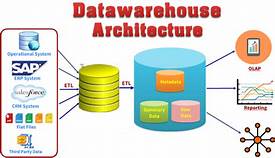Data Warehouse And Data Lake Definition And Differences
The Data Warehouse (DW) is considered the heart of a business data management system. DW is designed to help business managers to access and process large amounts of data quickly and efficiently. DW was originally developed by IBM as a relational database management (RDBMS) system and it is now used by many businesses worldwide. This article provides an overview of the Data Warehouse and Data Lake concepts and how they can benefit your business.
Data warehousing and data warehouse management is often considered a topic for IT professionals. However, a lot of small businesses don’t have the resources to invest in a robust DW solution. Instead, many small businesses manage their data manually. While manual handling of data may be efficient, it can also be a daunting task for a business manager who lacks the expertise and experience to operate effectively.
Today, there are several technologies available to help make data warehouse management easier. With the right tools, a business manager can make the process much more efficient. Here are some of the most common technologies that businesses use today to build their data warehouse.
One popular technology for data warehouse management is data mining. It works by searching large data sets for relevant information. For instance, if you have a list of products that you sell, you can perform a data mining search on those items to find products that are highly related to your list of products. A data warehouse management tool that uses this technique will pull information from multiple sources and group related data together. This approach is called parallel data mining.
Another popular technology for pulling information is extractor machines. These pull information from large databases and allow you to sort the data to reveal only the information you need. An example of a tool using this technology is IBM’s Power SQL. Another good example is Microsoft Access. Extractor tools pull information from data sources in many different formats, including text, relational, and object-oriented databases.
Many companies use a crawler to crawl websites for them. These types of tools can retrieve meta tags, title tags, and other meta-data that may be required to build a meaningful index. A crawler pulls information from sites like Wikipedia and Google, among others. It then indexes this data so that it can be searched. Meta-tags are used to describe a site, so it makes sense to pull as much as you can from sites that directly relate to your own.
Data extractors are not the only tools for pulling data out of a database. Some databases have a feature called extractors that work with what is known as an incremental crawler. This crawler will scan the database and look for anything new that it may find. If it finds something interesting, it will notify the application. The application can then either notify you can do your own discovery and download the information as you need it.
Data warehousing can save a business a lot of money by allowing it to save on overhead costs. Instead of having to rent boxes for every employee, purchase a truck or van, pay for delivery times, and so forth, you can put everything on a server and let the software take care of all the laborious tasks. You may be able to reduce your order time as well, depending on how complex your data warehouse is and the size of the items you pull. The time saved on administration costs can make the difference between success and failure.
With a properly designed data warehouse, your company will reap the benefits of cutting labor expenses while increasing sales. People will be able to quickly identify what they are looking for, even if you have thousands of products on your list. It will allow for accurate predictions about what your future orders will be and it will make it much easier for your customers to make purchases from you. You will no longer have to spend hours queuing at a cash register or dealing with customer complaints.
While it may seem daunting to begin your first venture into a data warehouse, it can be easy if you plan carefully and prepare adequately. Your system will need to be backed up regularly and you will need to have a good understanding of all the software and hardware that are required. You may also want to hire an information architect or a consultant who can help guide you in your development process.
When building your data warehouse, you will find there are many choices available to you. A popular choice is to purchase an all-in-one solution that will handle all of your business needs. If you have limited staff and money, an all-in-one solution is often the best option. However, if your business is growing and the number of items in your warehouse is becoming larger, it may be more cost effective to build your own warehouse from scratch. The only limitation to this approach is your imagination!
